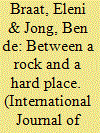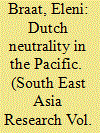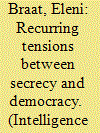| Srl | Item |
| 1 |
ID:
191087


|
|
|
|
|
| Summary/Abstract |
While scholarly literature has paid attention to human intelligence professionalism from the perspective of the agent handler, we know relatively little about the precarious positions in which (double) agents often find themselves and what their ensuing needs from their handlers consist of. This article suggests that (double) agents desire a reciprocal, affect-based relationship with their handlers, involving trust and gratitude, more than just a negotiated relationship based on (financial) agreements. This article explains the importance of such a relationship. The main source of this research consists of original, in-depth oral history interviews with former double agent “M.” He operated from the 1960s through the 1990s for the Dutch Security Service and the Central Intelligence Agency against the East German Ministerium für Staatssicherheit. The article analyzes the varying degrees of appreciation that these services showed for his work, and it investigates their consequences on the psychological well-being of the double agent.
|
|
|
|
|
|
|
|
|
|
|
|
|
|
|
|
| 2 |
ID:
188287


|
|
|
|
|
| Summary/Abstract |
The vast majority of intelligence history focuses on operations and executive decisionmaking rather than attending to, among other topics, analytical work or day-to-day organizational activities in the full (hierarchical) breadth of agencies. Especially in the studies on the Cold War period, one of the major implications of this research focus is that women, in so far as they are not part of top leadership or critical to operations, are excluded from analysis. This article argues that, during the Cold War period, security and intelligence services were constructed as a masculine profession. The article advances three professional standards that were constructed as masculine: a sense of responsibility, female support, and full-time availability. Empirically, this research focuses on the Dutch Security Service (in-depth interviews and archival research).
|
|
|
|
|
|
|
|
|
|
|
|
|
|
|
|
| 3 |
ID:
103508


|
|
|
|
|
| Publication |
2011.
|
| Summary/Abstract |
The international disarmament debate of the 1920s provided an important opportunity for the Netherlands to raise the international profile of its colonial interests. This paper examines how Dutch participants in the disarmament debate combined the long-lived Dutch principle of neutrality with the different geopolitical situation of the Dutch East Indies. It shows that (1) Dutch delegates did not strictly interpret and apply the principle of neutrality to their colony in the Pacific. This seems contrary to (2) the Dutch perception that the position in Europe was almost identical to the situation in the Pacific. The little attention paid to these different interests in the Netherlands and the Dutch East Indies arguably developed from (3) a surprising naivety and provincialism concerning the geopolitical position of the Dutch East Indies. These three related conclusions illustrate the unfortunate composition of the delegations to the disarmament negotiations and the ignorance with which the Foreign Ministry intervened in colonial issues, arguably also indicating that Dutch colonial external relations and defence policy were ill-defined and not effectively adapted to the Pacific context.
|
|
|
|
|
|
|
|
|
|
|
|
|
|
|
|
| 4 |
ID:
145240


|
|
|
|
|
| Summary/Abstract |
There is a recurring tension between secrecy and democracy. This article analyzes the continually ambiguous relations between intelligence and security agencies and their parliamentary principals. I present a novel conceptual framework to analyze political relations influenced by secrecy. I draw on Albert Hirschman's concepts of exit, voice and loyalty and Max Weber's ideal types of the ethics of conviction and responsibility. The focus is a case study of the Dutch parliament and Security Service between 1975 and 1995. The analysis demonstrates how parliament can deal constructively with the secret services. This depends both on party-political responses to secrecy and strategic responses on the part of the secret services to deteriorating relationships with parliament.
|
|
|
|
|
|
|
|
|
|
|
|
|
|
|
|